Are you seeking one-on-one college counseling and/or essay support? Limited spots are now available. Click here to learn more.

How to Write the AP Lang Rhetorical Analysis Essay (With Example)
November 27, 2023
Feeling intimidated by the AP Lang Rhetorical Analysis Essay? We’re here to help demystify. Whether you’re cramming for the AP Lang exam right now or planning to take the test down the road, we’ve got crucial rubric information, helpful tips, and an essay example to prepare you for the big day. This post will cover 1) What is the AP Lang Rhetorical Analysis Essay? 2) AP Lang Rhetorical Analysis Rubric 3) AP Lang Rhetorical Analysis: Sample Prompt 4) AP Lang Rhetorical Analysis Essay Example 5)AP Lang Rhetorical Analysis Essay Example: Why It Works
What is the AP Lang Rhetorical Analysis Essay?
The AP Lang Rhetorical Analysis Essay is one of three essays included in the written portion of the AP English Exam. The full AP English Exam is 3 hours and 15 minutes long, with the first 60 minutes dedicated to multiple-choice questions. Once you complete the multiple-choice section, you move on to three equally weighted essays that ask you to synthesize, analyze, and interpret texts and develop well-reasoned arguments. The three essays include:
Synthesis essay: You’ll review various pieces of evidence and then write an essay that synthesizes (aka combines and interprets) the evidence and presents a clear argument. Read our write up on How to Write the AP Lang Synthesis Essay here.
Argumentative essay: You’ll take a stance on a specific topic and argue your case.
Rhetorical essay: You’ll read a provided passage, then analyze the author’s rhetorical choices and develop an argument that explains why the author made those rhetorical choices.
AP Lang Rhetorical Analysis Rubric
The AP Lang Rhetorical Analysis Essay is graded on just 3 rubric categories: Thesis, Evidence and Commentary, and Sophistication . At a glance, the rubric categories may seem vague, but AP exam graders are actually looking for very particular things in each category. We’ll break it down with dos and don’ts for each rubric category:
Thesis (0-1 point)
There’s nothing nebulous when it comes to grading AP Lang Rhetorical Analysis Essay thesis. You either have one or you don’t. Including a thesis gets you one point closer to a high score and leaving it out means you miss out on one crucial point. So, what makes a thesis that counts?
- Make sure your thesis argues something about the author’s rhetorical choices. Making an argument means taking a risk and offering your own interpretation of the provided text. This is an argument that someone else might disagree with.
- A good test to see if you have a thesis that makes an argument. In your head, add the phrase “I think that…” to the beginning of your thesis. If what follows doesn’t logically flow after that phrase (aka if what follows isn’t something you and only you think), it’s likely you’re not making an argument.
- Avoid a thesis that merely restates the prompt.
- Avoid a thesis that summarizes the text but does not make an argument.
Evidence and Commentary (0-4 points)
This rubric category is graded on a scale of 0-4 where 4 is the highest grade. Per the AP Lang Rhetorical Analysis rubric, to get a 4, you’ll want to:
- Include lots of specific evidence from the text. There is no set golden number of quotes to include, but you’ll want to make sure you’re incorporating more than a couple pieces of evidence that support your argument about the author’s rhetorical choices.
- Make sure you include more than one type of evidence, too. Let’s say you’re working on your essay and have gathered examples of alliteration to include as supporting evidence. That’s just one type of rhetorical choice, and it’s hard to make a credible argument if you’re only looking at one type of evidence. To fix that issue, reread the text again looking for patterns in word choice and syntax, meaningful figurative language and imagery, literary devices, and other rhetorical choices, looking for additional types of evidence to support your argument.
- After you include evidence, offer your own interpretation and explain how this evidence proves the point you make in your thesis.
- Don’t summarize or speak generally about the author and the text. Everything you write must be backed up with evidence.
- Don’t let quotes speak for themselves. After every piece of evidence you include, make sure to explain your interpretation. Also, connect the evidence to your overarching argument.
Sophistication (0-1 point)
In this case, sophistication isn’t about how many fancy vocabulary words or how many semicolons you use. According to College Board , one point can be awarded to AP Lang Rhetorical Analysis essays that “demonstrate sophistication of thought and/or a complex understanding of the rhetorical situation” in any of these three ways:
- Explaining the significance or relevance of the writer’s rhetorical choices.
- Explaining the purpose or function of the passage’s complexities or tensions.
- Employing a style that is consistently vivid and persuasive.
Note that you don’t have to achieve all three to earn your sophistication point. A good way to think of this rubric category is to consider it a bonus point that you can earn for going above and beyond in depth of analysis or by writing an especially persuasive, clear, and well-structured essay. In order to earn this point, you’ll need to first do a good job with your thesis, evidence, and commentary.
- Focus on nailing an argumentative thesis and multiple types of evidence. Getting these fundamentals of your essay right will set you up for achieving depth of analysis.
- Explain how each piece of evidence connects to your thesis.
- Spend a minute outlining your essay before you begin to ensure your essay flows in a clear and cohesive way.
- Steer clear of generalizations about the author or text.
- Don’t include arguments you can’t prove with evidence from the text.
- Avoid complex sentences and fancy vocabulary words unless you use them often. Long, clunky sentences with imprecisely used words are hard to follow.
AP Lang Rhetorical Analysis: Sample Prompt
The sample prompt below is published online by College Board and is a real example from the 2021 AP Exam. The prompt provides background context, essay instructions, and the text you need to analyze. For sake of space, we’ve included the text as an image you can click to read. After the prompt, we provide a sample high scoring essay and then explain why this AP Lang Rhetorical Analysis essay example works.
Suggested time—40 minutes.
(This question counts as one-third of the total essay section score.)
On February 27, 2013, while in office, former president Barack Obama delivered the following address dedicating the Rosa Parks statue in the National Statuary Hall of the United States Capitol building. Rosa Parks was an African American civil rights activist who was arrested in 1955 for refusing to give up her seat on a segregated bus in Montgomery, Alabama. Read the passage carefully. Write an essay that analyzes the rhetorical choices Obama makes to convey his message.
In your response you should do the following:
- Respond to the prompt with a thesis that analyzes the writer’s rhetorical choices.
- Select and use evidence to support your line of reasoning.
- Explain how the evidence supports your line of reasoning.
- Demonstrate an understanding of the rhetorical situation.
- Use appropriate grammar and punctuation in communicating your argument.
AP Lang Rhetorical Analysis Essay Example
In his speech delivered in 2013 at the dedication of Rosa Park’s statue, President Barack Obama acknowledges everything that Parks’ activism made possible in the United States. Telling the story of Parks’ life and achievements, Obama highlights the fact that Parks was a regular person whose actions accomplished enormous change during the civil rights era. Through the use of diction that portrays Parks as quiet and demure, long lists that emphasize the extent of her impacts, and Biblical references, Obama suggests that all of us are capable of achieving greater good, just as Parks did.
Although it might be a surprising way to start to his dedication, Obama begins his speech by telling us who Parks was not: “Rosa Parks held no elected office. She possessed no fortune” he explains in lines 1-2. Later, when he tells the story of the bus driver who threatened to have Parks arrested when she refused to get off the bus, he explains that Parks “simply replied, ‘You may do that’” (lines 22-23). Right away, he establishes that Parks was a regular person who did not hold a seat of power. Her protest on the bus was not part of a larger plan, it was a simple response. By emphasizing that Parks was not powerful, wealthy, or loud spoken, he implies that Parks’ style of activism is an everyday practice that all of us can aspire to.
AP Lang Rhetorical Analysis Essay Example (Continued)
Even though Obama portrays Parks as a demure person whose protest came “simply” and naturally, he shows the importance of her activism through long lists of ripple effects. When Parks challenged her arrest, Obama explains, Martin Luther King, Jr. stood with her and “so did thousands of Montgomery, Alabama commuters” (lines 27-28). They began a boycott that included “teachers and laborers, clergy and domestics, through rain and cold and sweltering heat, day after day, week after week, month after month, walking miles if they had to…” (lines 28-31). In this section of the speech, Obama’s sentences grow longer and he uses lists to show that Parks’ small action impacted and inspired many others to fight for change. Further, listing out how many days, weeks, and months the boycott lasted shows how Parks’ single act of protest sparked a much longer push for change.
To further illustrate Parks’ impact, Obama incorporates Biblical references that emphasize the importance of “that single moment on the bus” (lines 57-58). In lines 33-35, Obama explains that Parks and the other protestors are “driven by a solemn determination to affirm their God-given dignity” and he also compares their victory to the fall the “ancient walls of Jericho” (line 43). By of including these Biblical references, Obama suggests that Parks’ action on the bus did more than correct personal or political wrongs; it also corrected moral and spiritual wrongs. Although Parks had no political power or fortune, she was able to restore a moral balance in our world.
Toward the end of the speech, Obama states that change happens “not mainly through the exploits of the famous and the powerful, but through the countless acts of often anonymous courage and kindness” (lines 78-81). Through carefully chosen diction that portrays her as a quiet, regular person and through lists and Biblical references that highlight the huge impacts of her action, Obama illustrates exactly this point. He wants us to see that, just like Parks, the small and meek can change the world for the better.
AP Lang Rhetorical Analysis Essay Example: Why It Works
We would give the AP Lang Rhetorical Analysis essay above a score of 6 out of 6 because it fully satisfies the essay’s 3 rubric categories: Thesis, Evidence and Commentary, and Sophistication . Let’s break down what this student did:
The thesis of this essay appears in the last line of the first paragraph:
“ Through the use of diction that portrays Parks as quiet and demure, long lists that emphasize the extent of her impacts, and Biblical references, Obama suggests that all of us are capable of achieving greater good, just as Parks did .”
This student’s thesis works because they make a clear argument about Obama’s rhetorical choices. They 1) list the rhetorical choices that will be analyzed in the rest of the essay (the italicized text above) and 2) include an argument someone else might disagree with (the bolded text above).
Evidence and Commentary:
This student includes substantial evidence and commentary. Things they do right, per the AP Lang Rhetorical Analysis rubric:
- They include lots of specific evidence from the text in the form of quotes.
- They incorporate 3 different types of evidence (diction, long lists, Biblical references).
- After including evidence, they offer an interpretation of what the evidence means and explain how the evidence contributes to their overarching argument (aka their thesis).
Sophistication
This essay achieves sophistication according to the AP Lang Rhetorical Analysis essay rubric in a few key ways:
- This student provides an introduction that flows naturally into the topic their essay will discuss. Before they get to their thesis, they tell us that Obama portrays Parks as a “regular person” setting up their main argument: Obama wants all regular people to aspire to do good in the world just as Rosa Parks did.
- They organize evidence and commentary in a clear and cohesive way. Each body paragraph focuses on just one type of evidence.
- They explain how their evidence is significant. In the final sentence of each body paragraph, they draw a connection back to the overarching argument presented in the thesis.
- All their evidence supports the argument presented in their thesis. There is no extraneous evidence or misleading detail.
- They consider nuances in the text. Rather than taking the text at face value, they consider what Obama’s rhetorical choices imply and offer their own unique interpretation of those implications.
- In their final paragraph, they come full circle, reiterate their thesis, and explain what Obama’s rhetorical choices communicate to readers.
- Their sentences are clear and easy to read. There are no grammar errors or misused words.
AP Lang Rhetorical Analysis Essay—More Resources
Looking for more tips to help your master your AP Lang Rhetorical Analysis Essay? Brush up on 20 Rhetorical Devices High School Students Should Know and read our Tips for Improving Reading Comprehension . If you’re ready to start studying for another part of the AP English Exam, find more expert tips in our How to Write the AP Lang Synthesis blog post.
Considering what other AP classes to take? Read up on the Hardest AP Classes .
- High School Success
Christina Wood
Christina Wood holds a BA in Literature & Writing from UC San Diego, an MFA in Creative Writing from Washington University in St. Louis, and is currently a Doctoral Candidate in English at the University of Georgia, where she teaches creative writing and first-year composition courses. Christina has published fiction and nonfiction in numerous publications, including The Paris Review , McSweeney’s , Granta , Virginia Quarterly Review , The Sewanee Review , Mississippi Review , and Puerto del Sol , among others. Her story “The Astronaut” won the 2018 Shirley Jackson Award for short fiction and received a “Distinguished Stories” mention in the 2019 Best American Short Stories anthology.
- 2-Year Colleges
- ADHD/LD/Autism/Executive Functioning
- Application Strategies
- Best Colleges by Major
- Best Colleges by State
- Big Picture
- Career & Personality Assessment
- College Essay
- College Search/Knowledge
- College Success
- Costs & Financial Aid
- Data Visualizations
- Dental School Admissions
- Extracurricular Activities
- Graduate School Admissions
- High Schools
- Homeschool Resources
- Law School Admissions
- Medical School Admissions
- Navigating the Admissions Process
- Online Learning
- Outdoor Adventure
- Private High School Spotlight
- Research Programs
- Summer Program Spotlight
- Summer Programs
- Teacher Tools
- Test Prep Provider Spotlight
“Innovative and invaluable…use this book as your college lifeline.”
— Lynn O'Shaughnessy
Nationally Recognized College Expert
College Planning in Your Inbox
Join our information-packed monthly newsletter.

AP® English Language
How to get a 6 on the argument frq in ap® english language.
- The Albert Team
- Last Updated On: March 1, 2022

What We Review
Introduction: How to Get a 6 on the Argument FRQ in AP® English Language
Wondering how to get a 6 on the argumentative essay in AP® English Language?
To score an 5 on the AP® English Argument FRQ question, the CollegeBoard scoring guidelines outline that students need to write an essay that effectively argues a position, uses appropriate and convincing evidence, and showcases a wide range of the elements of writing. Essays that score a 6 do all of that and, additionally, demonstrate sophistication in their argument.
An essay that does all of that is an incredibly well-constructed essay. Such an essay needs a solid framework and excellent support. To do this, it is important to have a clear idea of what you are being asked, to not waffle, to spend time and care with your thesis and outline, and to support every claim you make.
We know the best way to write an AP® English FRQ that does everything right is to understand what you are going to see on the AP® English Language test. Read on to prepare yourself for exam day and earn that 6!
What to Expect from the AP® English Language Argument Free Response Questions
The AP® English argument FRQ is the most straightforward of the AP® English FRQs because it is the most similar to the essays you’re already used to writing. It’s exciting to have free reign and make your own argument, unrestrained from rhetorical analysis devices or documents. But, like most AP® writing, it also can be a little overwhelming.
There’s nothing to read and analyze to provide evidence or help you form an argument. Whether you’re feeling excited or overwhelmed by the AP® writing argument FRQ, consider the rhetorical situation. Be strategic about forming your thesis, craft a strong, chronological argument, and utilize good, supportive evidence to earn a better overall essay response.
Determine the question.
The first question to ask yourself is what am I being asked to do ? This may seem obvious, but it’s surprising how tricky it can be to figure out. Look for keywords and phrases that will answer that question.
Here’s an example from the 2019 AP® English Language argumentative essay.

Though there are just two short paragraphs, there is a lot of room for confusion here. In this case, “Then, write a well-developed essay in which you explain your judgment.” is the key sentence you are looking for. In 2019, AP® English Language test takers were asked to select a concept, place, role, etc. that they believed was “overrated,” and explain why.
If you cannot determine what the question is, go back and reread the prompt. Focus on the last few sentences, as that’s where you’ll usually find it.
Knowing the question you are answering is the most important part of AP® writing. You will not be able to answer the question effectively if you aren’t certain what the question is. Pick out a specific sentence or two to determine the question, and thereby ensure that you aren’t just writing an essay that responds to the general sense of the argument essay prompts
Pick an opinion and stick to it.
The next step is both simple and difficult. Identify your own opinion on the subject.
But remember — the AP® argumentative essay exam format is designed to test how well you can craft an argument. Questions like the 2019 question seem so daunting, because claiming anything to be “overrated” is such a broad topic. It is a bigger question than students are used to encountering on an AP® test.
But, always remember, there is no right or wrong answer for this AP® English FRQ. And whatever argument you choose will not come back later in the exam or in your final grade in the class. This is not to say that you shouldn’t believe in what you are writing. Only that you should remember that both sides are arguable, pick one, and stick to it. Don’t waffle.
Below we break down two sample student answers from this same 2019 prompt.

In this AP® Lang argument essay example, the student jumps from describing places, to people, to outfits. The prompts asked for only one example and the student gives three. By doing this, it shows they were not only unable to grasp what the prompt was asking, but that they couldn’t stick to their opinion. Instead of deeply strengthening one choice, the student gives vague, half-reasons for too many choices. When writing your FRQs, choose just one concept and stick to it.
The following example demonstrates a strong student response:

This student picks one clear concept, capitalism, and clearly outlines their support for it. They write with clear language that opens the door for the deeper analysis coming later in the essay.
Like this student, choose just one clear argument to delve into when writing your FRQ.
Craft a thesis statement.
The thesis statement should be both simple and elegant. Students often find it one of the more difficult writing skills to master, but we’re here to help. Just remember that it should encompass your entire essay in just one sentence. So, for the 2019 argument FRQ :
Good thesis: While capitalism undeniably has its upsides, it has many downsides that are rarely recognized. When considering the downsides, capitalism is clearly overrated as it commodifies humanity and uplifts a minority at the expense of the majority.
This thesis breaks down a) that the author clearly states his claim that capitalism is overrated, b) that the author will support that claim with examples on how it commodifies humanity and how it hurts the majority in favor of the minority.
Good thesis: While the Electoral College was created in the name of equality for smaller states, it is ultimately overrated because it undercuts the popular vote, it is an archaic practice that is unsuitable for the modern era.
This thesis claims the Electoral College is overrated by claiming it doesn’t do what it was created to do in the first place- support equality. It also introduces two supporting examples for the rest of the essay- it undercuts the popular vote and it doesn’t work in the modern era.
Not a good thesis: Kicking a ball in a net and scoring, is not as important as saving lives. Soccer to me would be considered overrated.
This thesis doesn’t give clear direction for the rest of the essay. The author claims soccer is overrated, but doesn’t tell us why. The example that “it’s not as important as saving lives” is unrelated and also not touched on again later in the essay. This thesis isn’t specific and doesn’t give you a clear idea of what the author will be saying next.
Not a good thesis: The term “overrated” has been used in conversation to diminish the value of roles. In unusual circumstances the term “overrated” should be applied to the idea of freedom in regards to social change, but overall it should not be applied in regards to global devastation and cruel treatment.
This thesis does not directly answer the question. Is the author arguing that freedom is overrated? They also claim that the term overrated doesn’t apply to global devastation and cruel treatment. This second claim is both unrelated to the first and doesn’t work to answer the initial prompt.
Looking at these four examples, can you see the difference between a strong and weak thesis?
After you’ve determined your thesis, use it as a jumping point to sketch a quick outline. Then, follow your outline, bringing in your own concrete examples and evidence. Doing so will improve your AP® writing.
Return to the Table of Contents
Craft a chronological argument.
A good argument builds as you move through the essay. It does not simply repeat the same points. Instead, the different points of the argument build off one another and work together to advance the author’s point.
Let’s look at the 2018 AP® English argument FRQ for an example.

In this case, students are being asked to argue a position on the value of choosing the unknown.
All students are likely to have their own definitions of what “choosing the unknown” might mean. You first want to consider what this phrase means to you, and how it applies to the real world. Could it mean breaking out of your comfort zone in daily routines, or could it mean going to theater school to follow your dreams? There’s no wrong answers, but try to pin down one. Consider Lindbergh’s quote the prompt gives you, and how shock, disappointment, and enrichment play into choosing the unknown.
Once you’ve nailed down your definition, you can begin to form your arguments. A chronological argument builds off itself. So, in this question’s case, an outline would look something like this:
- Choosing the unknown is necessary for the development of the human race.
- Scientific advancements cannot be made without testing the boundaries of the unknown.
- Cultural and artistic growth can only occur through exploring the unknown.
First, a student must define what choosing the unknown means, and what makes it difficult. Next the student argues for the value of choosing the unknown, in that the human race could never develop without it. Finally, the student will argue for the invaluable scientific and cultural/artistic advances made throughout history by breaking known boundaries.
When you sketch your outline, quickly ask yourself if the outline would make just as much sense if you rearranged it. If the answer is no, start writing your essay. If the answer is yes, try to structure your argument so that your points build off one another.
Support your claims.
All arguments need evidence. This is the proof you need to support your thesis. And in the case of the AP® English argument FRQ, the evidence all comes from you. What exactly that evidence is will vary from question to question and from student to student. But make sure that every point you make is supported by evidence.
Here’s some good news — you already know quite a bit about effective evidence from what you have learned in AP® English about rhetorical devices. Your main purpose in this essay is to persuade. What have you learned in class about effective ways to persuade? What rhetorical devices can you utilize? Try to pick the best devices to support your argument that you can.
Here are some examples of supportive and non-supportive evidence that students could use to support their claims.

The 2017 AP® English language argument FRQ asked students to argue a position if the most essential skill is artifice. The example student answers given below are from here .
Supportive evidence: “Throughout history, rulers have utilized countless different methods of achieving power, however none have been so successful as mastering the art of lying.
In his advice to future rulers, Niccolo Machiavelli encouraged them to lie and maintain the illusion of sympathy to the common struggles in order to retain power. He asserts that it is imperative for a ruler to appear caring and sympathetic even if he has no objective but power.
Machiavelli argues that to be sincere and honest is akin to being vulnerable. A ruler must be skilled in the art of deception if he is not to fall prey to usurpers. Thus, it is essential that he appear humble and morally upright to his constituents as he is to appear idealistic, despite his nature being identical to his citizens.”
In this paragraph, the student chooses to discuss the role of artifice in politics. The student claims that mastering lying is essential to achieving political power. The student uses Machiavelli’s leadership and beliefs as specific examples to support this, by analyzing and connecting each point back to his/her claim.
Non-supportive evidence: “Another example would be actors on red carpets or at interviews they sound generous and relatable, but in reality they could be selfish people who don’t care about anyone. To the public they act charming, honest, and sincere. They do this so they can get famous and rich. They do this so they will never get ignored.”
In this paragraph, the student chooses to discuss the role of artifice in the culture of entertainment and celebrities. However, the student does not utilize supportive evidence to do so. The paragraph is full of claims about how actors lie, but does not provide a concrete example to anchor the claims. The student provides a lot of very vague generalizations, but no clear evidence or examples of specific celebrities and how they used artifice to succeed.
There is so much variance in prompts and students’ prior knowledge; it’s impossible to provide a checklist of what makes evidence supportive. But a good trick to decide if you’ve supported your claims well enough is to talk to yourself. No really, it’s a good idea.
Picture yourself discussing your essay with someone. Imagine that this person disagrees with everything that you say. Every time you make a claim, like that it’s important to be polite in an email, your imaginary person shakes their head and tells you no. How would you try to convince them? What examples would you use? Make sure that for each opinion you put forward; you have provided an answer to someone who would disagree with you.
The evidence is an important part of your essay. If your outline and your argument are a framework, your evidence is the brick and mortar. A house without brick and mortar won’t fall, but it won’t be a very nice house to inhabit. Tie every claim you make to a piece of evidence to ensure the best essay possible.
Wrapping Things Up: Scoring a 6 on the Argument FRQ for AP® English Language
The AP® English argument FRQ varies quite a bit. But it is ultimately about how well you can put forth an argument. So, don’t be afraid to spend some time crafting that argument. We’ve covered a lot in this article- here are the main points to remember:
- Determine the question. Figure out what the prompt is asking you to do.
- Pick an opinion and stick to it. Choose one side of the argument and one clear claim to support all the way through.
- Craft a thesis statement. Your thesis should be clear, concise, and introduce the content of your essay.
- Craft a chronological argument. Make an argument that builds on its prior points.
- Support your claims. Support yourself with concrete, specific evidence and examples.
But most of all, have fun. This essay is the one you should be looking forward to, where you have the freest rein. Enjoy it and earn yourself a 6.
Do the examples shown make sense to you? Can you picture yourself moving through the AP® writing argument FRQ with ease now?
Interested in a school license?
8 thoughts on “how to get a 6 on the argument frq in ap® english language”.
Thank you for explaining this so eloquently. Excellent post, I will keep this handy and refer to it often from now on. It’s so educative. Great post!
Sure, glad it helped.
I’m an AP® Language teacher and the title of your article caught my eye because the essays aren’t scored on a 0-9 scale anymore. The max score for an essay now is a 6. Essays are now scored in 3 categories: Thesis: 0 or 1 point Evidence and commentary: 0-4 points Sophistication: 0 or 1 point I just wanted to let you know! I saw this was last updated in 2020 and just thought it should reflect the current AP® exam.
Thank you for the heads up! This is an older blog post that must have had something else updated to it this year. We’ve gone ahead and revised the post.
Hi, my AP® Language teacher emphasized on a counterargument at the end of the supporting paragraphs. Could you elaborate on it? Also, how exactly do we get the sophistication point?
Hi Stephanie, thanks for reaching out! Making a solid counter-argument is definitely one way to make sure that you earn the Sophistication point. We recommend having a look at our AP® English Language Review Guide for 2021 for more tips! The College Board’s Free-Response Question and Scoring Information Archive also provides authentic examples of student writing — many of which successfully make counterarguments and rebuttals to earn the Sophistication point.
Hi can I get a 6?
Hi Roy, we certainly believe that earning a 6 on your FRQs is possible with practice and dedication! I’d recommend having a look at our AP® English Language Review Guide for tips and tricks, and you can also browse our AP® English Language and Composition Resource Page and Free Response practice questions for targeted practice.
Comments are closed.
Popular Posts

AP® Score Calculators
Simulate how different MCQ and FRQ scores translate into AP® scores

AP® Review Guides
The ultimate review guides for AP® subjects to help you plan and structure your prep.

Core Subject Review Guides
Review the most important topics in Physics and Algebra 1 .

SAT® Score Calculator
See how scores on each section impacts your overall SAT® score

ACT® Score Calculator
See how scores on each section impacts your overall ACT® score

Grammar Review Hub
Comprehensive review of grammar skills

AP® Posters
Download updated posters summarizing the main topics and structure for each AP® exam.

Expert Guide to the AP Language and Composition Exam

The AP Language and Composition Exam is a comprehensive assessment of students' reading, writing, and critical thinking skills. Here is an expert guide to help you navigate and excel in this exam:
1. Exam Format: The AP Language and Composition Exam consists of multiple-choice questions and free-response tasks. The multiple-choice section tests your reading comprehension and analysis skills, while the free-response section assesses your ability to write coherent and persuasive essays.
2. Analyzing Rhetorical Strategies: A key focus of the exam is analyzing and understanding rhetorical strategies used in various texts. This includes identifying and evaluating techniques such as ethos, pathos, logos, and rhetorical devices like imagery, figurative language, and tone. Practice analyzing different types of texts, including speeches, articles, essays, and advertisements.
3. Essay Writing Skills: The free-response section requires you to write three essays: a synthesis essay, a rhetorical analysis essay, and an argument essay. Develop strong essay writing skills, including thesis development, evidence selection, and paragraph organization. Practice constructing well-structured, coherent, and persuasive arguments within the given time constraints.
4. Close Reading and Annotation: Effective close reading and annotation skills are crucial for success in the exam. Learn to identify the main ideas, key details, and rhetorical elements in the provided passages. Annotate the text to mark important points, make connections, and track your understanding of the author's purpose and argument.
5. Vocabulary and Grammar: Enhance your vocabulary and grammar skills to express your ideas clearly and precisely. Use varied and appropriate language to convey your analysis and arguments effectively. Pay attention to sentence structure, punctuation, and word choice to ensure coherence and precision in your writing.
6. Practice and Timed Mock Exams: Regular practice is essential to build your skills and confidence. Take timed mock exams to simulate the exam conditions and develop your time management skills. Review your performance, identify areas for improvement, and seek feedback from teachers or peers.
7. Read Widely: Expand your reading repertoire by engaging with diverse texts from different genres and time periods. Reading extensively will improve your comprehension, vocabulary, and ability to recognize different writing styles and rhetorical strategies.
8. Critical Thinking and Analysis: Develop your critical thinking skills by analyzing the effectiveness of arguments, evaluating evidence, and recognizing biases and logical fallacies. Practice constructing well-reasoned arguments and counterarguments to strengthen your analysis.
9. Stay Updated with Current Events: Stay informed about current events and societal issues as they often form the basis of essay prompts and analysis passages. Familiarize yourself with contemporary debates, social, and political issues, and be prepared to apply your knowledge to the exam questions.
10. Seek Resources and Guidance: Utilize available resources, such as study guides, practice exams, and online resources, to enhance your preparation. Seek guidance from teachers, tutors, or peers to clarify any doubts and improve your understanding of the exam requirements.
The AP English Language and Composition Multiple-Choice
The multiple-choice section of the AP English Language and Composition exam assesses your reading comprehension and analysis skills. Here are some key points to understand and excel in this section:
1. Format and Structure: The multiple-choice section consists of a series of passages followed by a set of questions. The passages can include a variety of genres such as essays, speeches, articles, and excerpts from books or plays. Each passage is accompanied by multiple-choice questions that require you to analyze the author's purpose, rhetoric, and style.
2. Close Reading: Effective close reading is crucial for success in the multiple-choice section. Read the passages carefully, paying attention to details, tone, and the author's use of rhetorical devices. Underline or annotate important sections to help you remember key points and refer back to them when answering the questions.
3. Understanding Rhetorical Devices: Familiarize yourself with common rhetorical devices such as ethos, pathos, logos, irony, figurative language, and tone. These devices are frequently used by authors to convey their message and persuade the reader. Be prepared to identify and analyze how these devices contribute to the author's overall argument or purpose.
4. Analyzing Text Structure: Pay attention to the structure of the passages, including the organization of ideas, transitions, and the use of evidence. Identify the main idea, supporting details, and the logical flow of the author's argument. Understanding the structure of the passage will help you answer questions related to the author's intent and the development of their ideas.
5. Answering Strategies: Develop effective strategies for approaching multiple-choice questions. Read each question carefully, making sure to consider all the answer choices before selecting the best option. Pay attention to qualifiers such as "most likely," "least likely," "best supports," etc. Eliminate clearly incorrect choices and make an educated guess if you are unsure.
6. Time Management: The multiple-choice section is timed, so it is important to manage your time effectively. Pace yourself and allocate a specific amount of time for each passage and its corresponding questions. If you encounter a challenging question, mark it and move on, returning to it later if time permits.
7. Practice with Sample Questions: Familiarize yourself with the types of questions commonly asked in the AP English Language and Composition exam by practicing with sample questions. This will help you become more comfortable with the format and style of the questions and improve your ability to identify key elements in the passages.
8. Review Test-Taking Strategies: In addition to content knowledge, review general test-taking strategies that can improve your performance. This includes strategies for eliminating answer choices, using process of elimination, and managing your time effectively.
The AP English Language and Composition Free Response
The free response section of the AP English Language and Composition exam is designed to assess your ability to analyze and respond to rhetorical prompts effectively. Here are some key points to understand and excel in this section:
1. Format and Structure:
The free response section consists of three essay prompts: a synthesis essay, a rhetorical analysis essay, and an argument essay. Each prompt presents you with a specific task and requires you to analyze and respond to a given passage or passages.
2. Synthesis Essay:
In this essay, you are asked to combine information from multiple sources to create a coherent and well-supported argument. You must demonstrate your ability to understand and synthesize different perspectives on a given topic. It is important to analyze the sources critically, identify their main arguments, and use evidence from the sources to support your own argument.
3. Rhetorical Analysis Essay:
In this essay, you are required to analyze the rhetorical strategies employed by the author of a given passage. You need to identify and explain the author's use of rhetorical devices, such as ethos, pathos, logos, figurative language, and tone. Your analysis should focus on how these devices contribute to the author's overall argument and purpose.
4. Argument Essay:
In this essay, you are expected to construct and support your own argument on a given topic. You must develop a clear and coherent thesis statement, provide relevant evidence, and effectively address counterarguments. It is important to use persuasive techniques and rhetorical devices to strengthen your argument.
5. Organization and Structure:
Structure your essays in a clear and logical manner. Each essay should have an introduction that presents your thesis statement, body paragraphs that support your thesis with evidence and analysis, and a conclusion that summarizes your main points and reinforces your argument. Use topic sentences and transitions to ensure a smooth flow of ideas.
6. Evidence and Analysis:
Support your claims and arguments with evidence from the given passages or external sources. Use specific examples, quotes, and references to demonstrate your understanding and provide strong evidence for your analysis. Avoid making unsupported generalizations or relying solely on personal opinions.
7. Time Management:
The free response section is time-limited, so it is crucial to manage your time effectively. Allocate a specific amount of time for each essay and stick to it. Leave some time at the end to review and revise your essays for clarity, coherence, and grammatical correctness.
8. Practice and Preparation:
Familiarize yourself with the expectations and requirements of each essay type by practicing with past exam prompts and sample essays. Pay attention to the scoring guidelines provided by the College Board to understand how your essays will be evaluated. Seek feedback from teachers or peers to improve your writing skills and address any weaknesses.
AP English Language Prep Tips
Preparing for the AP English Language exam requires a strategic approach to enhance your reading, writing, and analytical skills. Here are some detailed tips to help you excel in your preparation:
1. Read Widely:
Develop a habit of reading a variety of texts, including fiction, non-fiction, essays, newspaper articles, and editorials. This will expose you to different writing styles, perspectives, and rhetorical devices. Pay attention to the author's tone, purpose, and argumentative strategies.
2. Analyze Rhetorical Devices:
Familiarize yourself with common rhetorical devices such as ethos, pathos, logos, figurative language, and rhetorical appeals. Practice identifying these devices in various texts and analyze how they contribute to the author's message and overall effectiveness.
3. Expand Vocabulary:
Enhance your vocabulary by reading challenging texts and keeping a vocabulary notebook. Learn new words, their definitions, and how they are used in context. Utilize these words in your writing to demonstrate a strong command of language.
4. Practice Timed Writing:
Time yourself while writing essays to simulate the exam conditions. Aim to complete essays within the time limit while maintaining clarity and coherence. Practice different essay types, such as synthesis, rhetorical analysis, and argument essays, to strengthen your skills in each area.
5. Read Sample Essays:
Study well-written sample essays from previous AP exams to understand the expectations and scoring criteria. Analyze their structure, use of evidence, and clarity of argument. Take note of effective introductions, strong thesis statements, and well-supported analysis.
6. Develop Writing Strategies:
Learn to effectively structure your essays with clear introductions, body paragraphs, and conclusions. Use topic sentences, transitions, and evidence to support your claims. Craft strong thesis statements that clearly state your position and guide your essay.
7. Analyze Visual Texts:
Practice analyzing visual texts such as graphs, charts, and images. Understand how visual elements convey information, make arguments, and support claims. Pay attention to the intended audience and the overall impact of visual texts.
8. Practice Multiple-Choice Questions:
Regularly practice multiple-choice questions to improve your reading comprehension and analysis skills. Read passages carefully, annotate as you go, and answer questions based on the given information. Pay attention to details, context, and authorial intent.
9. Seek Feedback:
Share your essays with teachers or peers and seek constructive feedback. Learn from their suggestions to improve your writing skills and address any weaknesses. Consider joining or forming study groups to discuss and analyze different texts and essay prompts.
10. Review Grammar and Mechanics:
Brush up on grammar rules and punctuation to ensure your writing is clear and error-free. Pay attention to sentence structure, verb tense, subject-verb agreement, and pronoun usage. A strong command of grammar enhances the clarity and effectiveness of your writing.
Remember that consistent practice, focused study, and critical reading are key to success in the AP English Language exam. Develop a study schedule, allocate time for reading and writing practice, and stay disciplined in your preparation. With dedication and effort, you can improve your skills and perform well on the exam.
AP Language and Composition Test Day Tips
On the day of the AP Language and Composition exam, it's important to be well-prepared and approach the test with confidence. Here are some detailed tips to help you make the most of your test day:
1. Get a Good Night's Sleep:
Ensure you have a restful night's sleep before the exam day. Being well-rested will help you stay focused and maintain mental clarity throughout the test.
2. Eat a Nutritious Breakfast:
Start your day with a healthy and balanced breakfast. Fueling your body with nutritious food will provide you with the energy you need for the duration of the exam.
3. Arrive Early:
Plan to arrive at the exam location early to avoid any unnecessary stress. Familiarize yourself with the exam venue and locate your assigned room beforehand.
4. Bring Necessary Materials:
Double-check that you have all the required materials for the exam, such as your admission ticket, identification, pens, pencils, erasers, and a watch to keep track of time. Be aware of any specific items allowed or prohibited by the testing guidelines.
5. Read Instructions Carefully:
Take the time to carefully read the instructions provided on the exam booklet and answer sheet. Understand the format, timing, and specific requirements for each section of the test.
6. Pace Yourself:
Time management is crucial in the AP Language and Composition exam. Allocate your time wisely, making sure to complete each section within the specified time limits. Pace yourself and avoid spending too much time on any single question or passage
7. Skim the Questions First:
Before diving into the reading passages, quickly skim the multiple-choice questions to get a sense of what to look for as you read. This can help you focus your attention and save time while reading and analyzing the passages.
8. Read Actively and Annotate:
As you read the passages, actively engage with the text. Underline key points, annotate important details, and mark passages that you may want to refer back to later. This will help you remember crucial information and facilitate your analysis.
9. Plan Your Essays:
For the essay sections, take a few minutes to plan your response before writing. Outline your main points, supporting evidence, and a clear thesis statement. This will provide structure to your essay and ensure a more coherent and organized response.
10. Review Your Work:
If time permits, take a moment to review your answers before submitting your exam. Check for any errors or incomplete responses, and make any necessary corrections or additions. Ensure that you have followed the instructions and provided clear and concise answers.
11. Stay Calm and Focused:
Throughout the exam, maintain a calm and focused mindset. Manage test anxiety by taking deep breaths, maintaining a positive attitude, and focusing on the task at hand. Remember that you have prepared for this exam and trust in your abilities.
12. Follow Exam Regulations:
Adhere to the exam regulations and guidelines provided by the College Board. Maintain academic integrity by refraining from any prohibited behavior, such as cheating or using unauthorized materials.
By following these tips, you can approach the AP Language and Composition exam with confidence and maximize your chances of success. Remember to stay calm, trust your preparation, and showcase your skills in analyzing and responding to complex texts. Good luck!
In conclusion, the AP Language and Composition exam can seem challenging, but with the right preparation and approach, you can excel. Understanding the exam format, practicing multiple-choice questions, mastering the free response section, and developing strong analytical and writing skills are essential for success. Additionally, following test day tips and maintaining a calm and focused mindset will help you perform at your best. By leveraging these insights and strategies, you can navigate the AP Language and Composition exam with confidence and achieve a high score. Good luck on your exam!
You Might Also Like

How to Ace Your Common App
Why common application play important role in college admission procedure? Get details about common application and how to create common app account - Read more

The Ultimate Guide to College Interviews
College interviews, although nerve wrecking, can be the best chance for you to impress the admissions officer. We give you tips on how to ace your interview.

The Secret to Getting off the Waitlist
So how would you go about making a letter of continued interest while you’re on the waiting status? Here’s a guide we’ve got for you.

Free Resources

Choose Your Test
- Search Blogs By Category
- College Admissions
- AP and IB Exams
- GPA and Coursework
Expert Guide to the AP Language and Composition Exam
Advanced Placement (AP)

With the 2023 AP English Language and Composition exam happening on Tuesday, May 9, it's time to make sure that you're familiar with all aspects of the exam. In this article, I'll give a brief overview of the test, do a deeper dive on each of the sections, discuss how the exam is scored, offer some strategies for studying, and finally wrap up with some essential exam day tips.
Exam Overview
The AP Language and Composition exam tests your rhetorical and composition skills. Essentially, how do authors construct effective arguments in their writing? What tools do they use? How can you use those tools to craft effective writing yourself? That is the essence of rhetorical analysis.
The exam has two parts: the first section is an hour-long, 45 question multiple-choice section. It includes five sets of questions, each based on a passage or passages. In this section, there will be 23-25 rhetorical analysis questions which test your rhetorical skills. There will also be 20-22 writing questions which require you to consider revisions to the texts you're shown.
The second section is free response. It starts with a 15-minute reading period, and then you'll have 120 minutes to write three analytical essays:
- One essay where you synthesize several provided texts to create an argument
- One essay where you analyze a nonfiction passage for its rhetorical construction
- One essay where you create an original argument in response to a prompt.
You will have about 40 minutes to write each essay, but no one will prompt you to move from essay to essay—you can structure the 120 minutes as you wish.
In the next sections I'll go over each section of the exam more closely—first multiple choice, and then free response.
The AP English Language and Composition Multiple-Choice
The multiple-choice section tests you on two main areas. The first is how well you can read and understand nonfiction passages for their use of rhetorical devices and tools. The second is how well you can "think like a writer" and make revisions to texts in composition questions.
You will be presented with five passages, about which you will receive a small amount of orienting information, e.g. "This passage is excerpted from a collection of essays on boating" or "This passage is excerpted from an essay written in 19th-century Haiti." Each passage will be followed by a set of questions.
There are, in general, eight question types you can expect to encounter on the multiple-choice section of the exam. I've taken my examples from the sample questions in the " Course and Exam Description ."

Magic eight-ball says there are eight types of multiple-choice questions!
Type 1: Reading Comprehension
These questions are focused on verifying that you understood what a certain part of the passage was saying on a concrete, literal level. You can identify these questions from phrases like "according to" "refers," etc. The best way to succeed on these questions is to go back and re-read the part of the passage referred to very carefully.

Type 2: Implication
These questions take reading comprehension one step further—they are primarily focused on what the author is implying without directly coming out and saying it. These questions will have a correct answer, though, based on evidence from the passage. Which interpretation offered in the answers does the passage most support? You can identify questions like these from words like "best supported," ‘"implies," "suggests," "inferred," and so on.

Type 3: Overall Passage and Author Questions
These questions ask about overall elements of the passage or the author, such as the author's attitude on the issue discussed, the purpose of the passage, the passage's overarching style, the audience for the passage, and so on.
You can identify these questions because they won't refer back to a specific moment in the text. For these questions, you'll need to think of the passage from a "bird's-eye view" and consider what all of the small details together are combining to say.

Type 4: Relationships Between Parts of the Text
Some questions will ask you to describe the relationship between two parts of the text, whether they are paragraphs or specific lines. You can identify these because they will usually explicitly ask about the relationship between two identified parts of the text, although sometimes they will instead ask about a relationship implicitly, by saying something like "compared to the rest of the passage."


Type 5: Interpretation of Imagery/Figurative Language
These questions will ask you about the deeper meaning or implication of figurative language or imagery that is used in the text. Essentially, why did the author choose to use this simile or this metaphor? What is s/he trying to accomplish?
You can generally identify questions like this because the question will specifically reference a moment of figurative language in the text. However, it might not be immediately apparent that the phrase being referenced is figurative, so you may need to go back and look at it in the passage to be sure of what kind of question you are facing.
Type 6: Purpose of Part of the Text
Still other questions will ask you to identify what purpose a particular part of the text serves in the author's larger argument. What is the author trying to accomplish with the particular moment in the text identified in the question?
You can identify these questions because they will generally explicitly ask what purpose a certain part of the text serves. You may also see words or phrases like "serves to" or "function."
Type 7: Rhetorical Strategy
These questions will ask you to identify a rhetorical strategy used by the author. They will often specifically use the phrase "rhetorical strategy," although sometimes you will be able to identify them instead through the answer choices, which offer different rhetorical strategies as possibilities.
Type 8: Composition
This is the newest question type, first seen in the 2019/2020 school year. For these questions, the student will need to act as though they are the writer and think through different choices writers need to make when writing or revising text.
These questions can involve changing the order of sentences or paragraphs, adding or omitting information to strengthen an argument or improve clarity, making changes to draw reader attention, and other composition-based choices.
Some very important stylish effects going on here.
The AP English Language and Composition Free Response
The free response section has a 15-minute reading period. After that time, you will have 120 minutes to write three essays that address three distinct tasks.
Because the first essay involves reading sources, it is suggested that you use the entire 15-minute reading period to read the sources and plan the first essay. However, you may want to glance at the other questions during the reading period so that ideas can percolate in the back of your mind as you work on the first essay.
Essay One: Synthesis
For this essay, you will be briefly oriented on an issue and then given anywhere from six to seven sources that provide various perspectives and information on the issue. You will then need to write an argumentative essay with support from the documents.
If this sounds a lot like a DBQ , as on the history AP exams, that's because it is! However, this essay is much more argumentative in nature—your goal is to persuade, not merely interpret the documents.
Example (documents not included, see 2022 free response questions ):
Essay Two: Rhetorical Analysis
In the second essay, you'll be presented with an excerpt from a nonfiction piece that advances an argument and asked to write an essay analyzing the rhetorical strategies used to construct the passage's argument. You will also be given some orienting information—where the passage was excerpted from, who wrote it, its approximate date, where it was published (if at all), and to whom it was directed.
Example (excerpt not included, see 2022 free response questions ):

Essay Three: Argument
In the third essay, you will be presented with an issue and asked to write a persuasive essay taking a position on the issue. You will need to support your position with evidence from your "reading, experience, and observations."
This doesn't look like a very well-constructed argument.
How The AP Language and Composition Exam Is Scored
The multiple-choice section of the exam is worth 45% of your score, and the free-response section is worth the other 55%. So each of the three free-response essays is worth about 18% of your score.
As on other APs, your raw score will be converted to a scaled score of 1-5. This exam has a relatively low 5 rate. Only 10% of test takers received a 5 in 2022 , although 56% of students received a score of 3 or higher.
In terms of how the raw score is obtained, the multiple-choice section is similar to other AP multiple-choice sections: you receive a point for every question you answer correctly, and there is no penalty for guessing.
The grading rubrics for the free-response questions were revamped in 2019. They are scored using analytic rubrics instead of holistic rubrics. For each free-response question, you will be given a score from 0-6. The rubrics assess three major areas:
#1: Thesis (0 to 1 points): Is there a thesis, and does it properly respond to the prompt?
#2: Evidence and Commentary (0 to 4 points): Does the essay include supporting evidence and analysis that is relevant, specific, well organized, and supports the thesis?
#3: Sophistication (0 to 1 points): Is the essay well-crafted and does it show a sufficiently nuanced understanding of the prompt?
Each scoring rubric broadly assesses these three factors. However, each task is also different in nature, so the rubrics do have some differences. I'll go over each rubric—and what it really means—for you here.
Synthesis Essay Rubrics
| 0 | For any of the following: | |
| 1 |
EVIDENCE AND COMMENTARY
| 0 | ||
| 1 | AND | |
| 2 | AND | |
| 3 | AND | |
| 4 | AND |
SOPHISTICATION
| 0 | ||
| 1 | Responses that earn this point may demonstrate sophistication of thought and/or a complex understanding of the rhetorical situation by doing any of the following: |

Time to synthesize this dough into some cookies.
Rhetorical Analysis Essay Rubrics
| 0 | ||
| 1 | AND | |
| 2 | AND | |
| 3 | AND AND | |
| 4 | AND AND |
Examine your texts closely!
Argumentative Essay Rubrics
The best kind of frenzy is a puppy frenzy!
AP English Language Prep Tips
Unlike its cousin, the AP English Literature and Composition exam, the AP Language and Composition exam (and course) have very little to do with fiction or poetry. So some students used to more traditional English classes may be somewhat at a loss as to what to do to prepare.
Luckily for you, I have a whole slate of preparation tips for you!
Read Nonfiction—In a Smart Way
A major thing you can do to prepare for the AP Lang and Comp exam is to read nonfiction— particularly nonfiction that argues a position , whether explicitly (like an op-ed) or implicitly (like many memoirs and personal essays). Read a variety of non-fiction genres and topics, and pay attention to the following:
- What is the author's argument?
- What evidence do they use to support their position?
- What rhetorical techniques and strategies do they use to build their argument?
- Are they persuasive? What counterarguments can you identify? Do they address them?
Thinking about these questions with all the reading you do will help you hone your rhetorical analysis skills.
Learn Rhetorical Terms and Strategies
Of course, if you're going to be analyzing the nonfiction works you read for their rhetorical techniques and strategies, you need to know what those are! You should learn a robust stable of rhetorical terms from your teacher, but here's my guide to the most important AP Language and Composition terms .
- We've compiled a list of 20 rhetorical devices you should know.
- A heroic individual from Riverside schools in Ohio uploaded this aggressively comprehensive list of rhetorical terms with examples. It's 27 pages long, and you definitely shouldn't expect to know all of these for the exam, but it's a useful resource for learning some new terms.
- Another great resource for learning about rhetorical analysis and how rhetorical devices are actually used is the YouTube Channel Teach Argument , which has videos rhetorically analyzing everything from Taylor Swift music videos to Super Bowl commercials. It's a fun way to think about rhetorical devices and get familiar with argumentative structures.
- Finally, a great book—which you might already use in your class—is " They Say, I Say. " This book provides an overview of rhetoric specifically for academic purposes, which will serve you well for AP preparation and beyond.
You also need to practice argumentative and persuasive writing. In particular, you should practice the writing styles that will be tested on the exam: synthesizing your own argument based on multiple outside sources, rhetorically analyzing another piece of writing in-depth, and creating a completely original argument based on your own evidence and experience.
You should be doing lots of writing assignments in your AP class to prepare, but thoughtful, additional writing will help. You don't necessarily need to turn all of the practice writing you do into polished pieces, either—just writing for yourself, while trying to address some of these tasks, will give you a low-pressure way to try out different rhetorical structures and argumentative moves, as well as practicing things like organization and developing your own writing style.
Not the most auspicious start to an argumentative essay.
Practice for the Exam
Finally, you'll need to practice specifically for the exam format. There are sample multiple-choice questions in the " AP Course and Exam Description ," and old free-response questions on the College Board website.
Unfortunately, the College Board hasn't officially released any complete exams from previous years for the AP English Language and Composition exam, but you might be able to find some that teachers have uploaded to school websites and so on by Googling "AP Language complete released exams." I also have a guide to AP Language and Composition practice tests .
Once you're prepped and ready to go, how can you do your best on the test?

AP Language and Composition Test Day Tips
Here are four key tips for test-day success.

You are one hundred percent success!
Interact With the Text
When you are reading passages, both on the multiple-choice section and for the first two free-response questions, interact with the text! Mark it up for things that seem important, devices you notice, the author's argument, and anything else that seems important to the rhetorical construction of the text. This will help you engage with the text and make it easier to answer questions or write an essay about the passage.
Think About Every Text's Overarching Purpose and Argument
Similarly, with every passage you read, consider the author's overarching purpose and argument. If you can confidently figure out what the author's primary assertion is, it will be easier to trace how all of the other aspects of the text play into the author's main point.
Plan Your Essays
The single most important thing you can do for yourself on the free-response section of the AP English Language exam is to spend a few minutes planning and outlining your essays before you start to write them.
Unlike on some other exams, where the content is the most important aspect of the essay, on the AP Language Exam, organization, a well-developed argument, and strong evidence are all critical to strong essay scores. An outline will help you with all of these things. You'll be able to make sure each part of your argument is logical, has sufficient evidence, and that your paragraphs are arranged in a way that is clear and flows well.
Anticipate and Address Counterarguments
Another thing you can do to give your free responses an extra boost is to identify counterarguments to your position and address them within your essay. This not only helps shore up your own position, but it's also a fairly sophisticated move in a timed essay that will win you kudos with AP graders.
Address counterarguments properly or they might get returned to sender!
Key Takeaways
The AP Language and Composition exam tests your rhetorical skills. The exam has two sections.
The first section is an hour-long, 45 question multiple-choice test based on the rhetorical techniques and composition choices.
The second section is a two-hour free-response section (with a 15-minute initial reading period) with three essay questions: one where you must synthesize given sources to make an original argument, one where you must rhetorically analyze a given passage, and one where you must create a wholly original argument about an issue with no outside sources given.
You'll receive one point for every correct answer on the multiple-choice section of the exam, which is worth 45% of your score. The free-response section is worth 55% of your score. For each free-response question, you'll get a score based on a rubric from 0-6. Your total raw score will be converted to a scaled score from 1-5.
Here are some test prep strategies for AP Lang:
#1 : Read nonfiction with an eye for rhetoric #2 : Learn rhetorical strategies and techniques #3 : Practice writing to deploy rhetorical skills #4 : Practice for the exam!
Here are some test-day success tips:
#1 : Interact with each passage you encounter! #2 : Consider every text's overarching purpose and argument. #3 : Keep track of time #4 : Plan your essays #5 : Identify and address counterarguments in your essays.
With all of this knowledge, you're ready to slay the AP English Language and Composition beast!
Noble knight, prepare to slay the AP dragon!
What's Next?
Want more AP Lang review? We have a complete collection of released AP Language practice tests , as well as a list of the AP Lang terms you need to know and a guide to the multiple choice section .
Taking the AP Literature exam? Check out our ultimate guide to the AP English Literature test and our list of AP Literature practice tests .
Taking other AP exams? See our Ultimate Guides to AP World History , AP US History , AP Chemistry , AP Biology , AP World History , and AP Human Geography .
Need more AP prep guidance? Check out how to study for AP exams and how to find AP practice tests .

These recommendations are based solely on our knowledge and experience. If you purchase an item through one of our links, PrepScholar may receive a commission.
Trending Now
How to Get Into Harvard and the Ivy League
How to Get a Perfect 4.0 GPA
How to Write an Amazing College Essay
What Exactly Are Colleges Looking For?
ACT vs. SAT: Which Test Should You Take?
When should you take the SAT or ACT?
Get Your Free

Find Your Target SAT Score
Free Complete Official SAT Practice Tests
How to Get a Perfect SAT Score, by an Expert Full Scorer
Score 800 on SAT Math
Score 800 on SAT Reading and Writing
How to Improve Your Low SAT Score
Score 600 on SAT Math
Score 600 on SAT Reading and Writing
Find Your Target ACT Score
Complete Official Free ACT Practice Tests
How to Get a Perfect ACT Score, by a 36 Full Scorer
Get a 36 on ACT English
Get a 36 on ACT Math
Get a 36 on ACT Reading
Get a 36 on ACT Science
How to Improve Your Low ACT Score
Get a 24 on ACT English
Get a 24 on ACT Math
Get a 24 on ACT Reading
Get a 24 on ACT Science
Stay Informed
Get the latest articles and test prep tips!

Ellen has extensive education mentorship experience and is deeply committed to helping students succeed in all areas of life. She received a BA from Harvard in Folklore and Mythology and is currently pursuing graduate studies at Columbia University.
Ask a Question Below
Have any questions about this article or other topics? Ask below and we'll reply!
What are your chances of acceptance?
Calculate for all schools, your chance of acceptance.
Your chancing factors
Extracurriculars.
How to Write the AP Lang Rhetorical Essay
Do you know how to improve your profile for college applications.
See how your profile ranks among thousands of other students using CollegeVine. Calculate your chances at your dream schools and learn what areas you need to improve right now — it only takes 3 minutes and it's 100% free.
Show me what areas I need to improve
What’s Covered:
What is the ap lang rhetorical essay, tips for writing the ap lang rhetorical essay.
- AP Lang Rhetorical Essay Example
How Will AP Scores Affect College Chances?
The AP English Language Exam is one of the most common AP exams you can take. However, the average score on the exam in 2020 was a 2.96 out of 5. While this may seem a bit low, it is important to note that over 550,000 students take the exam annually. With some preparation and knowing how to study, it is totally possible to do well on this AP exam.
The AP Lang Rhetorical Essay is one section of the AP English Language Exam. The exam itself is 3 hours and 15 minutes long, and is broken into two sections. The first part of the exam is a 60 minute, 45-question multiple-choice section. The questions on this part of the exam will test your ability to read a passage and then interpret its meaning, style, and overall themes. After the multiple-choice section, there is a section lasting 2 hours and 15 minutes with three “free response” essays. This includes the synthesis essay, the rhetorical analysis essay, and the argument essay.
- In the synthesis essay , you will have to develop an argument using pieces of evidence provided to you.
- The argumentative essay will have you pick a side in a debate and argue for or against it.
- The rhetorical essay requires that you discuss how an author’s written passage contributes to a greater meaning or theme.
The rhetorical essay is perhaps the most unique of all AP Lang exam essays because it requires the test taker to analyze and interpret the deeper meanings of the passage and connect them to the author’s writing style and writing syntax in only 40 minutes. This essay can be the trickiest because it requires you to have knowledge of rhetorical strategies and then apply them to a passage you’ve never seen before.
1. Outline Your Essay Before Writing
One of the most important parts of the AP Lang essays is structuring your essay so that it makes sense to the reader. This is just as important as having good content. For this essay in particular, you’ll want to read the passage first and write a brief outline of your points before you begin the essay. This is because you will want to write the essay using the passage chronologically, which will be discussed in detail below.
2. Understand Rhetorical Strategies
If you feel like you don’t know where to start as you prepare to study for the rhetorical essay portion of the exam, you aren’t alone. It is imperative that you have a grasp on what rhetorical strategies are and how you can use them in your essay. One definition of rhetoric is “language carefully chosen and arranged for maximum effect.” This can include types of figurative language (metaphor, simile, personification, pun, irony, etc.) elements of syntax (parallelism, juxtaposition, anthesis, anaphora, etc), logical fallacies, or persuasive appeals. Overall, there are many elements that you can analyze in an essay and having a good grasp on them through practice and memorization is important.
3. Keep the Essay Well Structured
Even if you understand the various rhetorical strategies you can use, where do you begin? First of all, you’ll want to write a strong introduction that outlines the purpose of the piece. At the end of this introduction, you will write a thesis statement that encapsulates all the rhetorical strategies you discuss. Perhaps these are style elements, tone, or syntax. Be sure to be specific as you list these.
Next, you will create your body paragraphs. As you discuss the rhetorical elements in the piece and tie them back to the work’s meanings, be sure to discuss the points in chronological order. You don’t have to discuss every single strategy, but just pick the ones that are most important. Be sure to cite the line where you found the example. At the end of the essay, write a short conclusion that summarizes the major points above.
4. Be Sure to Explain Your Examples
As you write the essay, don’t just list out your examples and say something like “this is an example of ethos, logos, pathos.” Instead, analyze how the example shows that rhetoric device and how it helps the author further their argument. As you write the rhetorical essay, you’ll want to be as specific and detail-focused as possible.

Discover your chances at hundreds of schools
Our free chancing engine takes into account your history, background, test scores, and extracurricular activities to show you your real chances of admission—and how to improve them.
AP Lang Rhetorical Analysis Essay Example
Below is a prompt and example for a rhetorical essay, along with its score and what the writer did well and could have improved:
The passage below is an excerpt from “On the Want of Money,” an essay written by nineteenth-century author William Hazlitt. Read the passage carefully. Then write an essay in which you analyze the rhetorical strategies Hazlitt uses to develop his position about money.
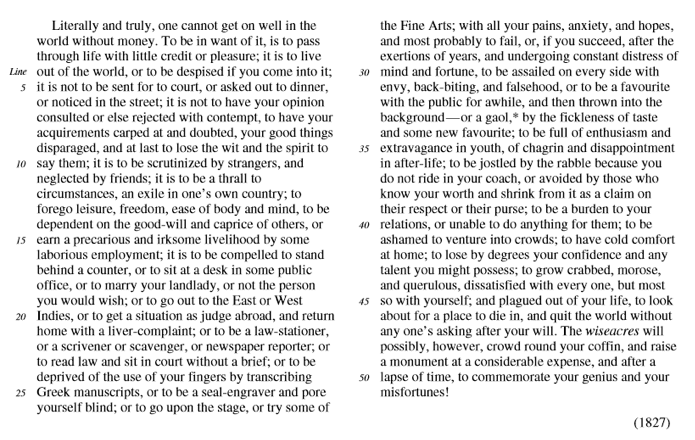
Student essay example:
In his essay, Hazlitt develops his position on money through careful use of adjectives and verbs, hypothetical situations, and images. His examples serve to impress upon the reader the highly negative consequences of being in “want of money.”
Hazlitt’s word choice in his opening phrase provides an example of his technique in the rest of the essay. It is not necessary to follow “literally” with “truly” yet his repetition of the same ideas emphasizes his point. In his next sentence, one that lasts forty-six lines, Hazlitt condignly repeats similar ideas, beating into his audience the necessity of having money in this world. The parallelism throughout that one long sentence, “it is not to be sent for to court, or asked out to dinner…it is not to have your own opinion consulted or sees rejected with contempt..” ties the many different situations Haziltt gives together. What could have become a tedious spiel instead becomes a melodious recitation, each example reminding you of one before it, either because of the similarities in structure or content. Hazlitt addresses many different negative effects of not having money but manages to tie them together with his rhetorical strategies.
The diction of the passage fully relays Hazlitt’s position about money. In every example he gives a negative situation but in most emphasizes the terrible circumstance with strong negative adjectives or verbs. “Rejected,” “contempt,” “disparaged,” “scrutinized,” “irksome,” “deprived,” “assailed” “chagrin;” the endless repetition of such discouragement shows how empathetically Hazlitt believes money is a requisite for a happy life. Even the irony of the last sentences is negative, conveying the utter hopelessness of one without money. Through one may have none in life, pitiless men will proceed to mock one’s circumstances, “at a considerable expense” after death!
In having as the body of his essay one long sentence, Hazlitt creates a flow that speeds the passage along, hardly giving the reader time to absorb one idea before another is thrown at him. The unceasing flow is synonymous with Hazlitt’s view of the life of a person without money: he will be “jostled” through life, unable to stop and appreciate the beauty around him or to take time for his own leisure.
The score on this essay was a 6 out of 6. This essay started out very strong as the student had a concrete thesis statement explaining the strategies that Hazlitt used to develop his position on money as well as Hazlitt’s belief on the topic. In the thesis statement, the student points out that adjectives, verbs, hypothetical situations, and images help prove Hazlitt’s point that wanting money can be problematic.
Next, the student broke down their points into three main subsections related to their thesis. More specifically, the student first discusses word choice of repetition and parallelism. When the student discusses these strategies, they list evidence in the paragraph that can be found chronologically in Hazlitt’s essay. The next paragraph is about diction, and the student used specific adjectives and verbs that support this idea. In the last paragraph, the student emphasized how the speed and flow of the essay helped describe Hazlitt’s viewpoint on life. This last concluding sentence is particularly thoughtful, as it goes beyond the explicit points made in the essay and discusses the style and tone of the writing.
It is important to remember that in some ways, the rhetorical essay is also an argumentative essay, as the student must prove how certain rhetorical strategies are used and their significance in the essay. The student even discussed the irony of the paragraph, which is not explicit in the passage.
Overall, this student did an excellent job organizing and structuring the essay and did a nice job using evidence to prove their points.
Now that you’ve learned about the AP Lang rhetorical essay, you may be wondering how your AP scores impact your chances of admission. In fact, your AP scores have relatively little impact on your admissions decision , and your course rigor has much more weight in the application process.
If you’d like to know your chances of admission, be sure to check out our chancing calculator! This tool takes into account your classes, extracurriculars, demographic information, and test scores to understand your chances at admission at over 600 schools. Best of all, it is completely free!

Related CollegeVine Blog Posts

Calculate for all schools
Your chance of acceptance, your chancing factors, extracurriculars, ap language sample essays.
Hey everyone, I'm currently preparing for the AP Language exam and was wondering if you could share some good sample essays or resources where I can find high-quality examples that really showcase effective argumentation and writing. Thanks!
Hi! It's great that you're looking for sample essays to prepare for the AP Language exam. Reviewing high-quality examples can certainly help improve your understanding of effective argumentation and writing. Here are a few resources to consider:
1. College Board: The official website for AP Exams offers sample essays and scoring guidelines for previous years' questions. You can find specific examples of argumentative, synthesis, and rhetorical analysis essays, along with detailed explanations of the scoring rubric. Visit their website and search for "AP Language free response" to access these materials.
2. AP Central: Another College Board resource, AP Central, provides numerous sample essays along with scoring commentary so you can see how each essay met the criteria set by the examiners. Explore the AP Lang sections of AP Central to find relevant articles: https://apcentral.collegeboard.org/
3. CollegeVine: This platform offers guidance and resources on a variety of topics related to college admissions, including AP exams. They have a blog post series that covers strategies for success on AP Lang, and you might find some essay samples there as well. You can click here: https://blog.collegevine.com/how-to-write-ap-lang-synthesis-essay/
4. JSTOR: Your school may have a subscription for JSTOR, which is a research database containing academic journals, books, and primary sources. You can access high-quality argumentative essays across different disciplines, helping you observe effective techniques used by various writers.
5. Google Scholar: Similar to JSTOR, Google Scholar can be used to search for academic resources and peer-reviewed papers. You might find well-constructed argumentative essays that provide valuable insights into writing styles and argumentation methods.
Don't forget to analyze not just the content but also the structure and strategies employed in these essays. Focus on identifying what makes them effective, and apply those techniques to your own writing. Good luck with your AP Language preparations!
About CollegeVine’s Expert FAQ
CollegeVine’s Q&A seeks to offer informed perspectives on commonly asked admissions questions. Every answer is refined and validated by our team of admissions experts to ensure it resonates with trusted knowledge in the field.
All Subjects
Argument Essay: Evidence
8 min read • june 18, 2024
Stephanie Kirk
We aren’t sure where it started, but many teachers use REHUGO to help students find evidence on the Argument FRQ . This acronym provides a quick check that can help you build logical evidence that supports your claim .
- R - Reading - Something you have read, fiction or nonfiction, that connects the given topic.
- E - Entertainment - A movie or song with dialogue or lyrics that present related ideas.
- H - History - An event, document, speech, or person from history that aligns with the given topic.
- U - Universal Truths - A common maxim or socially-accepted quote people tend to accept as truth.
- G - Government - A national or international current event or governmental situation related to the topic.
- O - Observations - Any cultural, technical, or societal trend that relates to the topic.
Suggested Guided Questions for the Argument FRQ
Now that you have a better understanding of the Argument FRQ’s expectations and scoring, let’s visit a sample prompt and add a few guided questions that you can use to help plan your own writings.
| In his book Canadian journalist Malcolm Gladwell (born 1963) writes: “To assume the best about another is the trait that has created modern society. Those occasions when our trusting nature gets violated are tragic. But the alternative—to abandon trust as a defense against predation and deception—is worse.”Write an essay that argues your position on the importance of . |
Guided Question 1: What does the prompt say? 📝
- Why do I do this? Understanding the concept or idea presented by the prompt is vital to planning a response that thoroughly addresses the prompt and stays on topic throughout. This is where you are going to BAT the PROMPT .
- Background : Gladwell asserts that society should trust each other in order to continue to be productive. Assuming the best about each other presents a better outcome than assuming the worst about each other.
- Advice : The new stable prompt wording does not give much advice, but you should revisit advice you learned in class or from us as Fiveable -- things like using Toulmin to plan your response and planning modes of development that help progress your reasoning.
- Task : Write an essay giving your position about the importance of trust. Specifically, is Gladwell right or wrong? And why? 🎥 Watch: AP Lang - Argumentation, Part I: It's a Trap!
Rhetorical Situation : When writing for AP Lang, it is important to consider the rhetorical situation and write in a manner that demonstrates an understanding of all elements of that situation.
- Context - the historical, social, and cultural movements in the time of the text
- Exigence - the urgency that leads to an action
- Purpose - the goal the speaker wants to achieve and the desired audience movement
- Persona - the “mask” shown to his/her audience

Guided Question 2: What do I think? 💡
Why do I do this? Taking a moment to brainstorm ideas can help organize thoughts and build an outline that you can revisit if you lose your train of thought in the stress of timed writing.
What does it look like? This might just be stream-of-consciousness in your head, cloud diagrams, or even bulleted notes on the side of your prompt, but it needs to end with a clear position statement you can use for your thesis statement . For example: Trust is important. It does suck to get betrayed though but having a positive outlook creates positive results. Thinking the worst makes people act negatively because they project in a way that leads toward the worst response. ⬇️
- Thesis Statement: Although some people believe humanity seems self-interested, a trusting nature enables individuals to focus on the positive and treat others with the respect that foster positive interrelationships.
Guided Question 3: What evidence can I use? 🤔
- Why do I do this? Revisit REHUGO and use Toulmin to plan your body paragraphs based on the thesis statement you came to when brainstorming ideas.
- Modes of Development: When writing, it is helpful to arrange the overall essay and its parts in a way that aligns with the purpose. Consider these basic modes and how you might use them in writing an argumentative essay.- Cause and Effect attempt to follow the chain of events and establish causation. The description brings imagery and details into a text so that it set up the tone and ensures the reader can follow the mood.- Classification allows the speaker to categorize things in a way that guides the reader to follow the line of reasoning.- Comparison , looking at the similarities and differences, helps to analyze the intricate details of a given topic. Because this describes differing elements, it may be structured by the element or by the characteristic.- Definition works to explain what something is or is not. By defining the subject being discussed, the speaker is able to control the thinking about that subject. Because this helps to clarify the topic, it is generally used in the introductory section of argumentation.- Exemplification is used when explaining the topic or situation by giving examples to help lead the audience to the desired conclusion.- Narration tells a story or gives an anecdote to help illustrate the point.- Process Analysis serves to explain the process by which something is done.
- What does it look like? I always use a version of the T-chart because one side is my evidence and the other side helps me consider multiple perspectives. You may not have an idea in all areas, and you may have multiple ideas in one area. Try to time yourself so that you get plenty of strong evidence without wasting too much time. | Supports 🏗️ | Thoughts 💭 | | --- | --- | | ~ R - Trust in Society by Cook points out that we only realize the importance of trust when there’s a breakdown.~ R - Essay “Importance of Trust” from class said that trust is not easy but it is what builds the foundation of a relationship and drives all actions between sides.~ E - The 2011 movie Trust shows that too much trust can get you hurt or killed.~ E - The media has so much bias it can’t be trusted… ~ H - Revolutionary War - trusted founding fathers and God’s position resulting in breaking free from Britain~ U - Trust - People should be trusted until proven otherwise~ G - A criminal escaped in our town and was on the loose; we trusted police to do their job rather than resort to vigilante justice~ G - Trust the president will have our best interests at heart -- most appear to have done that~ O - App-based dating - relies on trusting the person you meet online before meeting in person | > relationships between couples> trust in contractual agreements? Moral obligation for trust?> Counter?> Relied on trust and won with not much else to go ob> Ex, Parents, Teachers, Siblings > Trust helped keep us safe; job was well done when we were out of the way> Obvious exceptions; System of impeachment |
🎥 Watch: AP Lang - Review: Argument Body Paragraphs
PRO TIP: What if you have more evidence for the other side? Well, you haven’t started writing just yet, so it isn’t too late to go back and revise the thesis statement. Sometimes this happens in looking for evidence, and that’s perfectly okay. In fact, many times students will say they wrote an essay using evidence that went completely against what they felt in their head or heart just because they couldn’t put a logical argument on paper without getting too emotional. Know your audience, and build your argument.
Guided Question 4: How should I effectively organize my response? 📈
- Why do I do this? This step helps to outline the response so that your ideas are organized before you start writing. The general advice is to follow the structure of Classical Argumentation , but there is no rule saying that must be done to score well on the rubric. 💯
- What does it look like? One way of doing this would be to mark numbers by ideas tracked and written in the brainstorm, but some do take a moment to build an outline with topic sentences.
- Modes of Development: When writing, it is helpful to arrange the overall essay and its parts in a way that aligns with the purpose. Consider these basic modes and how you might use them in writing an argumentative essay.- Cause and Effect attempt to follow the chain of events and establish causation. The description brings imagery and details into a text so that it set up the tone and ensures the reader can follow the mood.- Classification allows the speaker to categorize things in a way that guides the reader to follow the line of reasoning.- Comparison , looking at the similarities and differences, helps to analyze the intricate details of a given topic. Because this describes differing elements, it may be structured by the element or by the characteristic.- Definition works to explain what something is or is not. By defining the subject being discussed, the speaker is able to control the thinking about that subject. Because this helps to clarify the topic, it is generally used in the introductory section of argumentation.- Exemplification is used when explaining the topic or situation by giving examples to help lead the audience to the desired conclusion.- Narration tells a story or gives an anecdote to help illustrate the point.- Process Analysis serves to explain the process by which something is done.
- Start by creating Toulmin Position Statements that can be used for topic sentences and then move into a writing plan. Here’s a sample for this prompt:
Sample Outline:
- Revised Thesis: Although some people believe trust must be earned, maintaining a trusting nature is important because it enables society to focus on positivity and create positive interrelationships that lead to positive outcomes.
- Universal truth
- Observation
- Entertainment - refute
- Conclude: When considering the value of trust in society, it is clear that the benefits of granting trust far outweigh the consequences of withholding it.
Key Terms to Review ( 35 )
© 2024 fiveable inc. all rights reserved., ap® and sat® are trademarks registered by the college board, which is not affiliated with, and does not endorse this website..
Synthesis Essay Materials
The two synthesis essay questions below are examples of the question type that has been one of the three free-response questions on the AP English Language and Composition Exam as of the May 2007 exam. The synthesis question asks students to synthesize information from a variety of sources to inform their own discussion of a topic. Students are given a 15-minute reading period to accommodate the additional reading required for the question.
Below is a sample synthesis essay question, sample scoring guidelines, comments from the Chief Reader about the sample student essays, seven sample student responses, and scoring commentary for each sample.
Approximately 300 AP English Language and Composition students from eight schools in New York, Maine, Texas, Tennessee, Washington, Florida, and New Mexico wrote responses to this synthesis topic. Students from these schools were given a 15-minute reading period followed by a 40-minute writing period in which to complete the sample synthesis assignment.
- AP English Language and Composition Synthesis Essay #1 (.pdf/84KB)
- Sample Scoring Guidelines (.pdf/43KB)
- Comments from the Chief Reader (.pdf/47KB)
- Sample Student Responses (.pdf/3.65MB)
- Scoring Commentary (.pdf/50KB)
An additional sample synthesis essay question is provided here.
- AP English Language and Composition Synthesis Essay #2 (.pdf/338KB)

IMAGES
COMMENTS
Typically, the AP Lang Argument Essay prompt asks you to reflect on a broad cultural, moral, or social issue that is open to debate. For evidence, you won't be asked to memorize and cite statistics or facts. Rather, you'll want to bring in real-world examples of: Historical events. Current-day events from the news.
The question directed students to read carefully an excerpt of William Hazlitt's 1827 essay, "On the Want of Money," and to analyze the rhetorical strategies the author uses to develop his position about money. Sample: 2A Score: 8. This essay's control and focus are evident from the first sentence.
2. Pick one side of the argument, but acknowledge the other side. When you write the essay, it's best if you pick one side of the debate and stick with it for the entire essay. All your evidence should be in support of that one side. However, in your introductory paragraph, as you introduce the debate, be sure to mention any merit the ...
Download free-response questions from this year's exam and past exams along with scoring guidelines, sample responses from exam takers, and scoring distributions. If you are using assistive technology and need help accessing these PDFs in another format, contact Services for Students with Disabilities at 212-713-8333 or by email at ssd@info ...
AP Lang Exam Basics. The AP Lang exam is separated into two sections. In the first section, students have one hour to answer a series of 45 multiple-choice questions. Here, about half of the questions are based on passages students read. The other half are focused on the best revision techniques.
While there are multiple essay examples online, we've chosen one to take a closer look at. We're going to give you a brief analysis of one of these example student synthesis essays from the 2019 AP Lang Exam below! Example Synthesis Essay AP Lang Response. To get started, let's look at the official prompt for the 2019 synthesis essay:
The AP Lang exam has two sections. The first consists of 45 multiple choice questions which need to be completed in an hour. This portion counts for around 45% of your total score. These questions ask students to analyze written pieces and answer questions related to each respective passage.
examples test takers used. The Question Leader continues, "Students connected to the topic in surprising, powerful, and beautiful ways. That level of connection extended to even the lower-scoring essays. Even responses that struggled with the abstraction of 'perfection,' could still articulate a position." Students were
In your response you should do the following: Respond to the prompt with a thesis that presents a defensible position. Select and use evidence from at least three of the provided sources to support your line of reasoning. Indicate clearly the sources used through direct quotation, paraphrase, or summary.
Writing an argumentative essay for AP Language and Composition requires a strategic approach to effectively convey your perspective. Here's a guide to crafting an impressive argumentative essay: 1. Understand the Prompt: - Tip: Carefully read and analyze the prompt. Identify the key elements, including the task you are asked to perform and any ...
The AP Lang Rhetorical Analysis Essay is one of three essays included in the written portion of the AP English Exam. The full AP English Exam is 3 hours and 15 minutes long, with the first 60 minutes dedicated to multiple-choice questions. Once you complete the multiple-choice section, you move on to three equally weighted essays that ask you ...
Pick an opinion and stick to it. Choose one side of the argument and one clear claim to support all the way through. Craft a thesis statement. Your thesis should be clear, concise, and introduce the content of your essay. Craft a chronological argument. Make an argument that builds on its prior points.
Sample: 3B Score: 6. An adequate response, this essay asserts that knowing whom to trust is the key in this media-saturated world. The essay's three evidence paragraphs present examples of trustworthy and perhaps not-so-trustworthy people, including Rush Limbaugh, Tom Cruise, and retired CBS anchor Walter Cronkite.
1. Exam Format: The AP Language and Composition Exam consists of multiple-choice questions and free-response tasks. The multiple-choice section tests your reading comprehension and analysis skills, while the free-response section assesses your ability to write coherent and persuasive essays. 2.
You're on the right track by looking at real examples to improve your AP Lang argument essays. The College Board website is a great place to start, as they provide sample essays for past prompts and even include scoring guidelines. ... Good luck with your AP Lang essays and feel free to reach out if you have any more questions. 8 months ago ...
The AP English Language and Composition Multiple-Choice. The multiple-choice section tests you on two main areas. The first is how well you can read and understand nonfiction passages for their use of rhetorical devices and tools. The second is how well you can "think like a writer" and make revisions to texts in composition questions.
In your response you should do the following: Respond to the prompt with a thesis that presents a defensible position. Provide evidence to support your line of reasoning. Explain how the evidence supports your line of reasoning. Use appropriate grammar and punctuation in communicating your argument. 2023 College Board.
Tips for Writing the AP Lang Rhetorical Essay. 1. Outline Your Essay Before Writing. One of the most important parts of the AP Lang essays is structuring your essay so that it makes sense to the reader. This is just as important as having good content. For this essay in particular, you'll want to read the passage first and write a brief ...
Hello! It's a great idea to learn from high-scoring essay examples as it helps you understand what's expected and refine your writing skills. One of the best resources for sample essays is the College Board website, which provides essay samples from actual AP English Language and Composition exams. These samples include scoring guidelines and explanations, so you can see how each essay meets ...
AP English Language and Composition Rhetorical Analysis Free-Response Question (2020) Sample Student Responses . 3 . Sample B [1] On April 9, 1964, United States First Lady Claudia Johnson gave a speech in honor of Eleanor Roosevelt. She spoke to those in attendance of the luncheon, specifically talking to the women within the crowd.
1. College Board: The official website for AP Exams offers sample essays and scoring guidelines for previous years' questions. You can find specific examples of argumentative, synthesis, and rhetorical analysis essays, along with detailed explanations of the scoring rubric. Visit their website and search for "AP Language free response" to ...
It is typically based on the knowledge and experience of the person offering it. Argument FRQ: An Argument FRQ (Free Response Question) is an essay question on the AP English Language exam that requires students to construct and defend an argument using evidence and rhetorical strategies. Audience: The audience refers to the intended recipients ...
The two synthesis essay questions below are examples of the question type that has been one of the three free-response questions on the AP English Language and Composition Exam as of the May 2007 exam. The synthesis question asks students to synthesize information from a variety of sources to inform their own discussion of a topic. Students are given a 15-minute reading period to accommodate ...